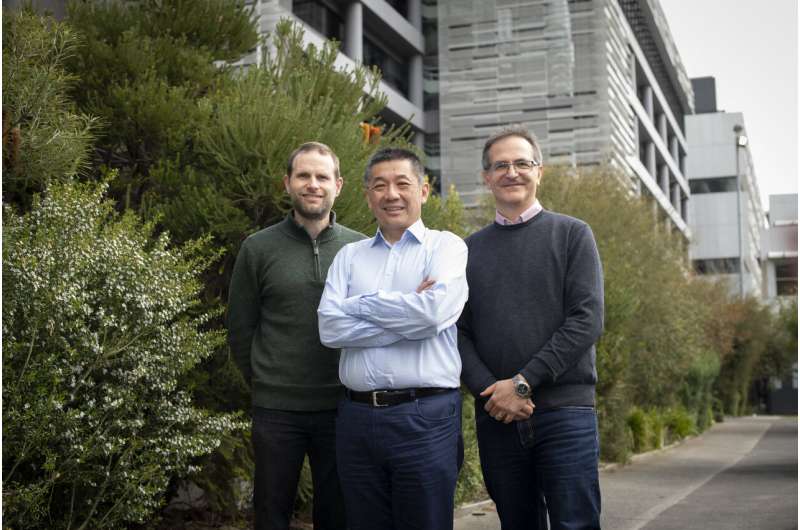Cell death blocker prevents healthy cells from dying

Scientists in Australia have developed a world-first compound that can keep cells alive and functioning in a perfectly healthy state when they otherwise would have died.
The ability to swiftly intervene and prevent cell death, or apoptosis, could be game-changing for medical emergencies and procedures, such as minimising cellular damage after heart attacks, or preserving organs for transplants.
The preclinical findings, published in the journal Nature Chemical Biology, follow 11 years of collaborative research at the Walter and Eliza Hall Institute of Medical Research—a world leader in cell death studies.
The study was led by Professor David Huang, Professor Guillaume Lessene and Professor Benjamin Kile, who is now at Monash University.
Professor Lessene, head of the Institute's New Medicines and Advanced Technologies theme, said the new 'cell death blocker' was exceptional for its ability to keep cells alive and healthy in the laboratory.
"Never before have we seen such promising ability to intervene in the earliest stages of apoptosis before irreversible damage occurs," Professor Lessene said.
Professor Huang, a laboratory head in the Institute's Blood Cells and Blood Cancers division, said the ability to stop unwanted cell death could be invaluable for the future of medical care.
"Acute injury can cause cells to die rapidly leading to the loss and weakening of tissues and muscles. In such circumstances, being able to prevent uncontrolled cell death could improve a patient's recovery, or even their chances of survival," Professor Huang said.
Apoptosis is a form of tightly regulated cell death essential for health and development. This process is controlled by the 'BCL-2 family' of proteins. Within this family, some proteins promote cell survival, while others drive cell death. Proteins called BAK and BAX are involved in a critical step of cell death known as the 'point of no return'. Cells are committed to die once either BAK or BAX is activated.
Professor Kile, Head of Anatomy and Developmental Biology at the Monash Biomedicine Discovery Institute, said the compound successfully disabled BAK.
"In laboratory models we found we could override apoptosis and keep cells functioning," he said.
"We have shown it is possible to halt the biochemical cascade that triggers cell death, right at the point where it begins".
The proof-of-concept drug was developed through extensive medicinal chemistry following a high throughput screening campaign of a quarter of a million potential small drug molecules.
The laboratories involved have since formed the foundation of the Walter and Eliza Hall Institute's National Drug Discovery Centre, a world-class facility that has opened for scientists across Australia to pursue their drug discovery journeys without having to head overseas.
The Institute's expertise in cell death research spans more than 30 years, beginning with the landmark discovery in the late 1980s that the protein BCL-2 could enable prolonged cancer cell survival. This critical discovery helped to inform the development of an anti-cancer treatment for patients with leukaemia.
The new research shines light on 'the other side of the same coin'; offering hope that one day drugs that successfully intervene to block apoptosis could be used to treat conditions such as cardiovascular diseases and degenerative disorders.
The researchers are now looking to apply the knowledge to developing cell death blockers that are effective and safe in humans.
Professor Huang said the next steps would also involve applying the knowledge we have gained to more advanced models of disease.
"There could be applications for keeping cells alive to prevent degenerative diseases," he said.
More information: A small molecule interacts with VDAC2 to block mouse BAK-driven apoptosis, Nature Chemical Biology (2019). DOI: 10.1038/s41589-019-0365-8 , nature.com/articles/s41589-019-0365-8
Journal information: Nature Chemical Biology
Provided by Walter and Eliza Hall Institute




















